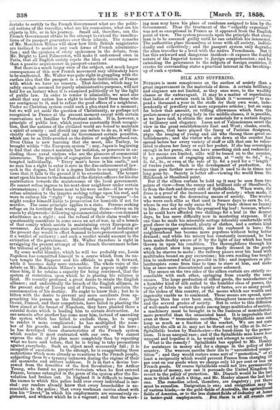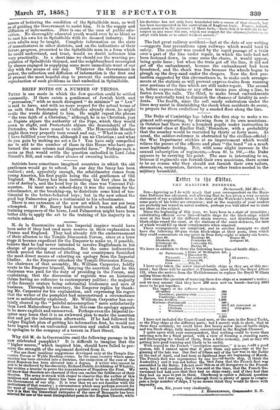SILK AND SUFFERING.
NOTICING is more conspicuous on the surface of society than a great improvement in the materials of dress. A certain brilliancy and elegance are not limited, as they once were, to the wealthy classes or the extravagant. It may be a matter of reprobation that ladies of a certain rank in life think it " necessary " to ex- pend a thousand a year in the stuffs for their own wear, inde- pendently of jewellery and more expensive articles ; but on sums far below that amount, on trifling allowances which form the pooket-money of a young lady in the middle classes, it is possible, as we have said, to obtain the raw materials for a certain degree of brilliancy and elegance. Laces not of Valenciennes court the view in the great establishments East and West; cloaks, scarfs, and capes, that have piqued the fancy of Parisian designers, pique the longing of young and old who throng those great es- tablishments; and the visitor who sits down at the counter has spread before her every variety of stuff or silk that can be calcu- lated to charm her fancy or suit her pocket. If she has sovereigns enough in her purse, she can have something rich and recherché; if her means are limited, silks will be tossed on to the counter, by a gentleman of engaging address, at "only 4s. 6d.," 48., 38. 6d., 3s., or even at the rate of 2s. 8d. a yard for a " length" of twelve yards. Such is the development of production. An income goes farther now-a-days than it used to do in times not long gone by. Society is better off—viewing the world from the Hitchcock or Shoolbred. point. But if the silken curtain be held up it may be seen from two points of view—from the sunny and brilliant side of Shoolbred's, or from the dark and dreary side of Spitalfields. When worn, the dress is a proof of the increased means of society ; when made, it is a testimony to the decreasing means of society. The weaver who wove such silks as that used in former days to earn 28. 5d., where in our day he only earns 8d. Free trade shines no luxury to him ; does not give him the promised big loaf; because, where- as he could have afforded two shillings for a loaf in the dearest days,. he has more difficulty now in mustering sixpence. If at one time he made his miserable cottage tolerably comfortable with good cheer in the cupboard, plenty of clothes, and a certain kind of huggermugger amusement, now his cupboard is bare; the neighbourhood has become more populous without being better dramed ; and while his misery has constantly- increased, he has been made doubly aware of it by the light of day which has been thrown in upon his condition. The thoroughfares through his own district show him passengers finely dressed in the goods which he starves to make ; the railway passes over his head with multitudes bound on gay excursions; 'his own reading has taught
i
him to understand what s possible in life ; and inspectors or phi- lanthropists come from time to time to stare at him, and make him at once more discontented and more ashamed.
The scenes on the two sides of the silken curtain are strictly re- concilable with each other, springing from exactly the same causes. The large production of silken goods, the manufacture of a humbler kind of silk suited to the humbler class of purses, the variety of fabric to suit the variety of tastes are so many proofs of the riches of this country, of the means Aida our wealth and ingenuity enable us to command. Those means are spread, more perhaps than has ever been seen, throughout immense numbers and the several grades of society. But in order to this diffusion of well-made and various goods among large multitudes of society, a machinery must be brought in to the business of manufacture more powerful than the unassisted hand. It is improbable that even at these "tremendous sacrifices," the Spitalfields man can keep so much as a fraction of the market. We are not sure whether the silk at 3s. may not be thrust out by silks at 2s. 6d.- Spitalfields beaten by Manchester—the hand-loom by the power - loom. It is an unequal race ; and if the Spitalfields man knew how unequal and hopeless it is, he would not attempt to continue it. What is the remedy? Spitalfields has applied to Mr. Henley for assistance in money and for a change in the policy of this country. The weavers ascribe their ills to "unrestricted compe- tition " ; and they would restore some sort of' protection," or at least a reciprocity which would. prevent France from charging 30 per cent on our goods when we charge only 15 per cent or less on French goods. Of course Spitalfields could not liveently on grants of money, nor can it persuade the United=lom to revert to the policy of protection. Mr. Disraeli would be the last man to think of such a thing, and Mr. Henley almost the last but one. The remedies asked, therefore, are nugatory ; yet there must be remedies. Emigration is one; and emigration may be of various kinds,—to the gold-fields of Australia, the agricultural fields of America, or to the less distant fields of industry at home in better-paid employments. But there is at all events one means of bettering the condition of the Spitalfields man, as well as of guiding the Government to assist him. It is the supply and diffusion of information. Here is one of the uses of public edu- cation. No thoroughly educated youth would ever be so blind as to cast his own lot in Spitalfields with its doomed industry. But even adults may be taught. Complete information on the state of manufactures in other districts, and on the indications of their future progress, presented to the Spitalfields man in a form which he could understand, and trust, would no doubt influence him very practically. In a short time we should see the weaving po- pulation of Spitalfields thinned, and the neighbourhood reoccupied by classes engaged in supplying some more immediate want of our day with the means of our day. Whatever the Government in power, the collection and diffusion of information is the first and at present the most hopeful step to prevent the continuance and reproduction of such problems as that embodied in Spitalfields.



























 Previous page
Previous page